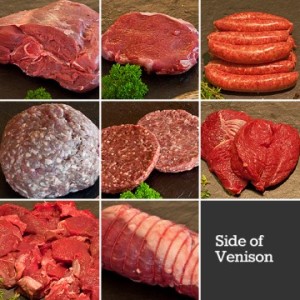 However, they refused to identify which areas were affected by the outbreak or the ages of the victims although it is thought they are a mixture of adults and children.
However, they refused to identify which areas were affected by the outbreak or the ages of the victims although it is thought they are a mixture of adults and children.
The bacterium, which is common in deer, causes people to become ill with stomach cramps, vomiting, often bloody diarrhea and fever. It can prove fatal in some cases, especially for the elderly and young children.
The latest outbreak is linked to venison products purchased from “various outlets”, including sausages, grill steaks, steaks and meatballs which were cooked at home.
Venison has enjoyed a surge in popularity in recent years, thanks to marketing campaigns, mentions by TV chefs and greater uptake by high-street retailers.
Health Protection Scotland (HPS) said eight of the latest victims were now recovering at home while one patient remains in hospital.
Officials were unable to say whether further cases will emerge over the coming days, although the fear will be that many more people will fall ill.
Scotland’s leading expert in bacteriology, Emeritus Professor Hugh Pennington, of the University of Aberdeen, said Scotland had hundreds of cases of E. coli every year resulting in a small number of deaths, adding, “Here we go again. In the past it was the fast-food outlets that were the issue with rare burgers but now the cases are increasingly linked to home cooking.
“I think the latest outbreak which I believe is linked to venison products is carried out on the premise that all cases resulted from a single event such as a deer carcass severely riddle by E.coli which is totally invisible to the eye, but of course they have to do a lot of testing to establish the facts.”
 A statement on the latest cases said: “Health Protection Scotland is investigating nine confirmed cases of E.coli O157 PT32 across Scotland. These cases have all consumed various venison products including, venison sausages, grill steaks, steaks and meatballs which were raw when purchased and cooked at home.”
A statement on the latest cases said: “Health Protection Scotland is investigating nine confirmed cases of E.coli O157 PT32 across Scotland. These cases have all consumed various venison products including, venison sausages, grill steaks, steaks and meatballs which were raw when purchased and cooked at home.”
Dr Syed Ahmed, consultant in health protection and clinical director, stressed there were simple ways to avoid infection and added: “It is important that all deer meat should be cooked thoroughly and should not be eaten medium or rare. The risk of E.col O157 infection can be reduced by carful handwashing, especially after contact with animals, handling raw meats, after going to the toilet and immediately before preparing or eating food and by making sure that food is always properly prepared.”
Not so simple.
The advice fails to mention cooking with a thermometer – what is medium or rare? – and the risks of cross-contamination.
